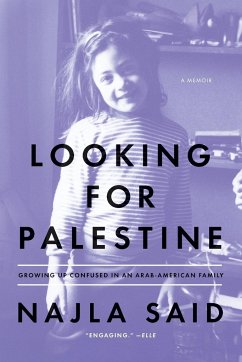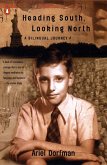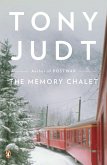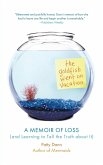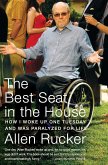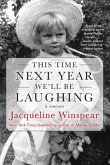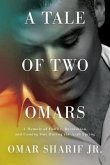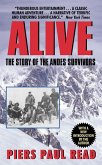A frank and entertaining memoir from the daughter of Edward Said now in paperback.
The daughter of the famous intellectual and outspoken Palestinian advocate Edward Said and a sophisticated Lebanese mother, Najla Said grew up in New York City, confused and conflicted about her cultural background and identity. Said knew that her parents identified deeply with their homelands, but growing up in a Manhattan world that was defined largely by class and conformity, she felt unsure about who she was supposed to be, and was often in denial of the differences she sensed between her family and those around her. She may have been born a Palestinian Lebanese American, but Said denied her true roots, even to herself until, ultimately, the psychological toll of her self-hatred began to threaten her health.
As she grew older, she eventually came to see herself, her passions, and her identity more clearly. Today she is a voice for second-generation Arab Americans nationwide.
Hinweis: Dieser Artikel kann nur an eine deutsche Lieferadresse ausgeliefert werden.
The daughter of the famous intellectual and outspoken Palestinian advocate Edward Said and a sophisticated Lebanese mother, Najla Said grew up in New York City, confused and conflicted about her cultural background and identity. Said knew that her parents identified deeply with their homelands, but growing up in a Manhattan world that was defined largely by class and conformity, she felt unsure about who she was supposed to be, and was often in denial of the differences she sensed between her family and those around her. She may have been born a Palestinian Lebanese American, but Said denied her true roots, even to herself until, ultimately, the psychological toll of her self-hatred began to threaten her health.
As she grew older, she eventually came to see herself, her passions, and her identity more clearly. Today she is a voice for second-generation Arab Americans nationwide.
Hinweis: Dieser Artikel kann nur an eine deutsche Lieferadresse ausgeliefert werden.
"The scholar Edward Said was born in Jerusalem when it was Palestine under the British Mandate, immigrated to the U.S., was baptized an Episcopalian, supported Palestinian independence, married a Lebanese Quaker, and became a prominent professor at Columbia University. No wonder his daughter, Najla, was conflicted about her identity. If Edward's Orientalism provides the intellectual framework for understanding postcolonialism, Najla's memoir, Looking for Palestine , is the other side of the coin, as those same complex forces tug her life in multiple directions while she tries to understand who she is." - Daily Beast
" In her engaging memoir, Looking for Palestine , Najla Said explores the cultural confusions of growing up Arab-American in the1970s and '80s New York City." - Elle
"What proves substantive and memorable about this book . . is the author's exploration of her relationship with her family and her social surroundings. . . . her snapshots of personal interaction with her father and their sometimes droll exchanges give the book an undeniably warm and intimate feel." - San Francisco Chronicle
"Said's aching memoir explores her coming-of-age as a Christian Arab-American on New York's Upper West Side. . . . [Said's] complex persona, self-deprecationg humor, and focus on the personal rather than the political broaden the appeal of Said's book beyond any particular ethnic, cultural, or religious audience." - Publishers Weekly (starred review)
"In an illuminating memoir, the daughter of Edward Said, the writer, academic and symbol of Palestinian self-determination, explores her complex family history and its role in shaping her identity. . . . An enlightening, warm, timely coming-of-age story exploring the author's search for identity framed within the confounding maze of America's relationship with the Middle East." - Kirkus
"It can be a difficult story to tell: that of one's discontent in the midst of privilege. And yet with great skill, humor, and poignancy, Ms. Said accomplishes just that. In the end, she is her late father's great inheritor, ever-journeying toward that elusive home." - Alica Erian, author of Towelhead
"Najla Said's Looking for Palestine is a compassionate and candid book on her courageous coming-of-age in contemporary America. Said is a brilliant, talented and sensitive artist with a larger-than-life, loving father." - Professor Cornel West
"A deeply penetrating, often hilarious, and occasionally devastating account of growing up Arab American. Of course, Najla Said's scramble for her identity is uniquely hers. How many of us, after all, have had world-famous intellectuals as fathers, experienced the civil war in Lebanon first hand, and been kissed on the cheek by Yasir Arafat (which she hated)? But after finally finding the conviction to be at peace with herself, Najla Said has written more than a memoir. Looking for Palestine is a survivor's guide for all of us who live with that feeling of being out of place wherever we are." - Moustafa Bayoumi, author of How Does it Feel to Be a Problem?: Being Young and Arab in America
"Thoughtful, searching, and open-eyed, Looking for Palestine takes readers on a journey into an Arab-American girl's search for identity. The joy and pain of growing up in the long shadow of a brilliant parent, the struggle for meaning and belonging, and the painful dispossession of the Palestinians are all treated with tender care as Najla Said gives us a haunting and singular life story." - Diana Abu-Jaber, author of Crescent
" In her engaging memoir, Looking for Palestine , Najla Said explores the cultural confusions of growing up Arab-American in the1970s and '80s New York City." - Elle
"What proves substantive and memorable about this book . . is the author's exploration of her relationship with her family and her social surroundings. . . . her snapshots of personal interaction with her father and their sometimes droll exchanges give the book an undeniably warm and intimate feel." - San Francisco Chronicle
"Said's aching memoir explores her coming-of-age as a Christian Arab-American on New York's Upper West Side. . . . [Said's] complex persona, self-deprecationg humor, and focus on the personal rather than the political broaden the appeal of Said's book beyond any particular ethnic, cultural, or religious audience." - Publishers Weekly (starred review)
"In an illuminating memoir, the daughter of Edward Said, the writer, academic and symbol of Palestinian self-determination, explores her complex family history and its role in shaping her identity. . . . An enlightening, warm, timely coming-of-age story exploring the author's search for identity framed within the confounding maze of America's relationship with the Middle East." - Kirkus
"It can be a difficult story to tell: that of one's discontent in the midst of privilege. And yet with great skill, humor, and poignancy, Ms. Said accomplishes just that. In the end, she is her late father's great inheritor, ever-journeying toward that elusive home." - Alica Erian, author of Towelhead
"Najla Said's Looking for Palestine is a compassionate and candid book on her courageous coming-of-age in contemporary America. Said is a brilliant, talented and sensitive artist with a larger-than-life, loving father." - Professor Cornel West
"A deeply penetrating, often hilarious, and occasionally devastating account of growing up Arab American. Of course, Najla Said's scramble for her identity is uniquely hers. How many of us, after all, have had world-famous intellectuals as fathers, experienced the civil war in Lebanon first hand, and been kissed on the cheek by Yasir Arafat (which she hated)? But after finally finding the conviction to be at peace with herself, Najla Said has written more than a memoir. Looking for Palestine is a survivor's guide for all of us who live with that feeling of being out of place wherever we are." - Moustafa Bayoumi, author of How Does it Feel to Be a Problem?: Being Young and Arab in America
"Thoughtful, searching, and open-eyed, Looking for Palestine takes readers on a journey into an Arab-American girl's search for identity. The joy and pain of growing up in the long shadow of a brilliant parent, the struggle for meaning and belonging, and the painful dispossession of the Palestinians are all treated with tender care as Najla Said gives us a haunting and singular life story." - Diana Abu-Jaber, author of Crescent

